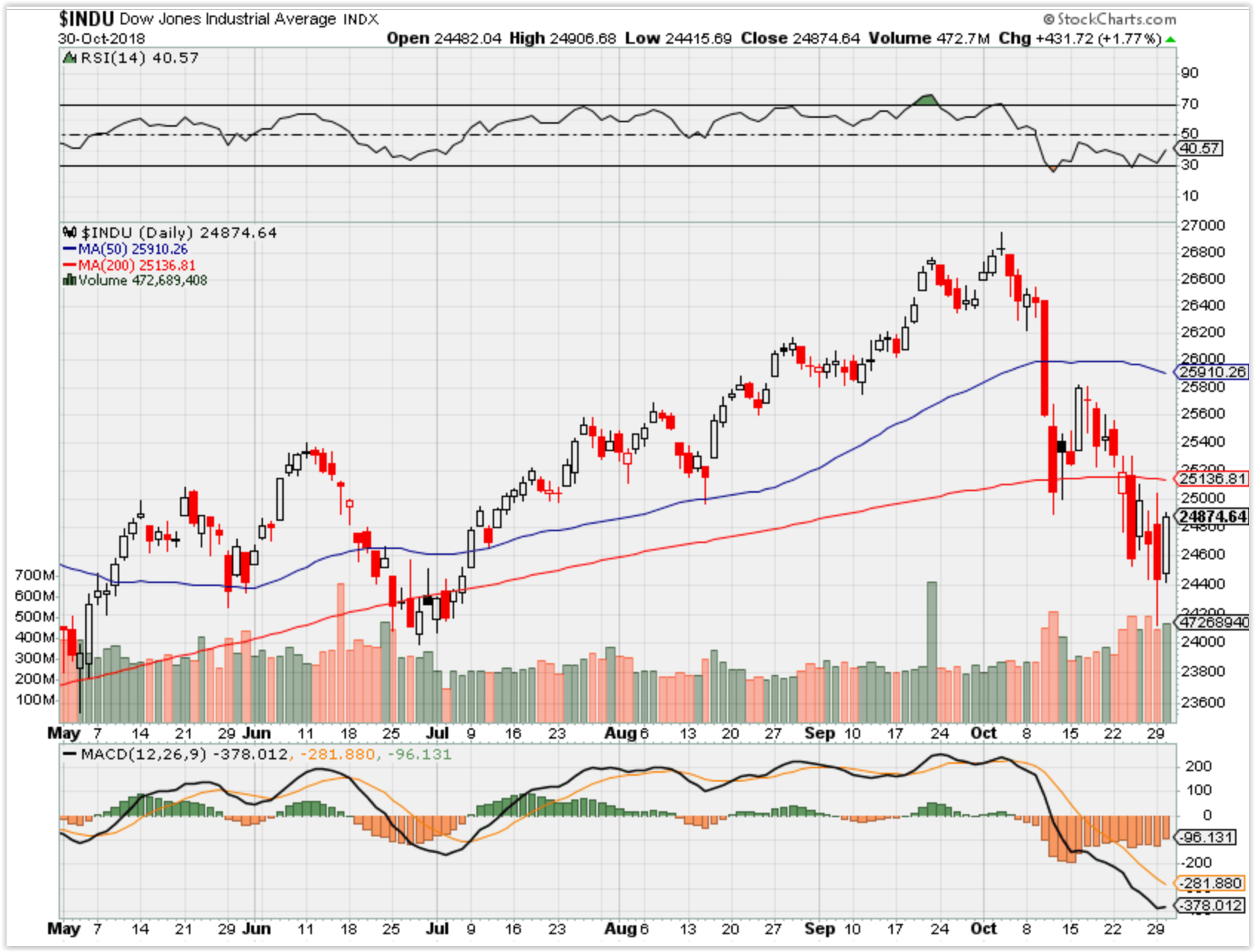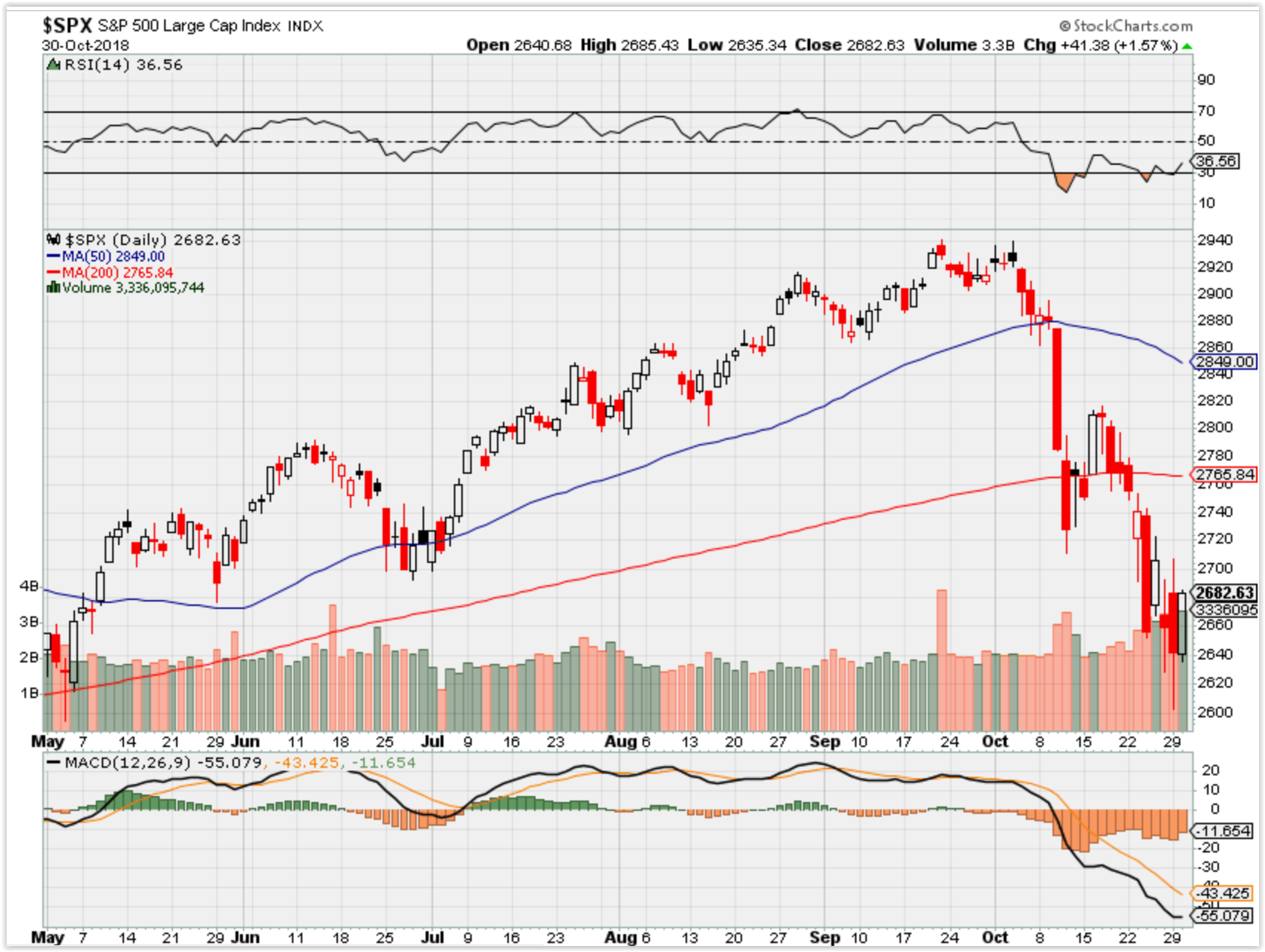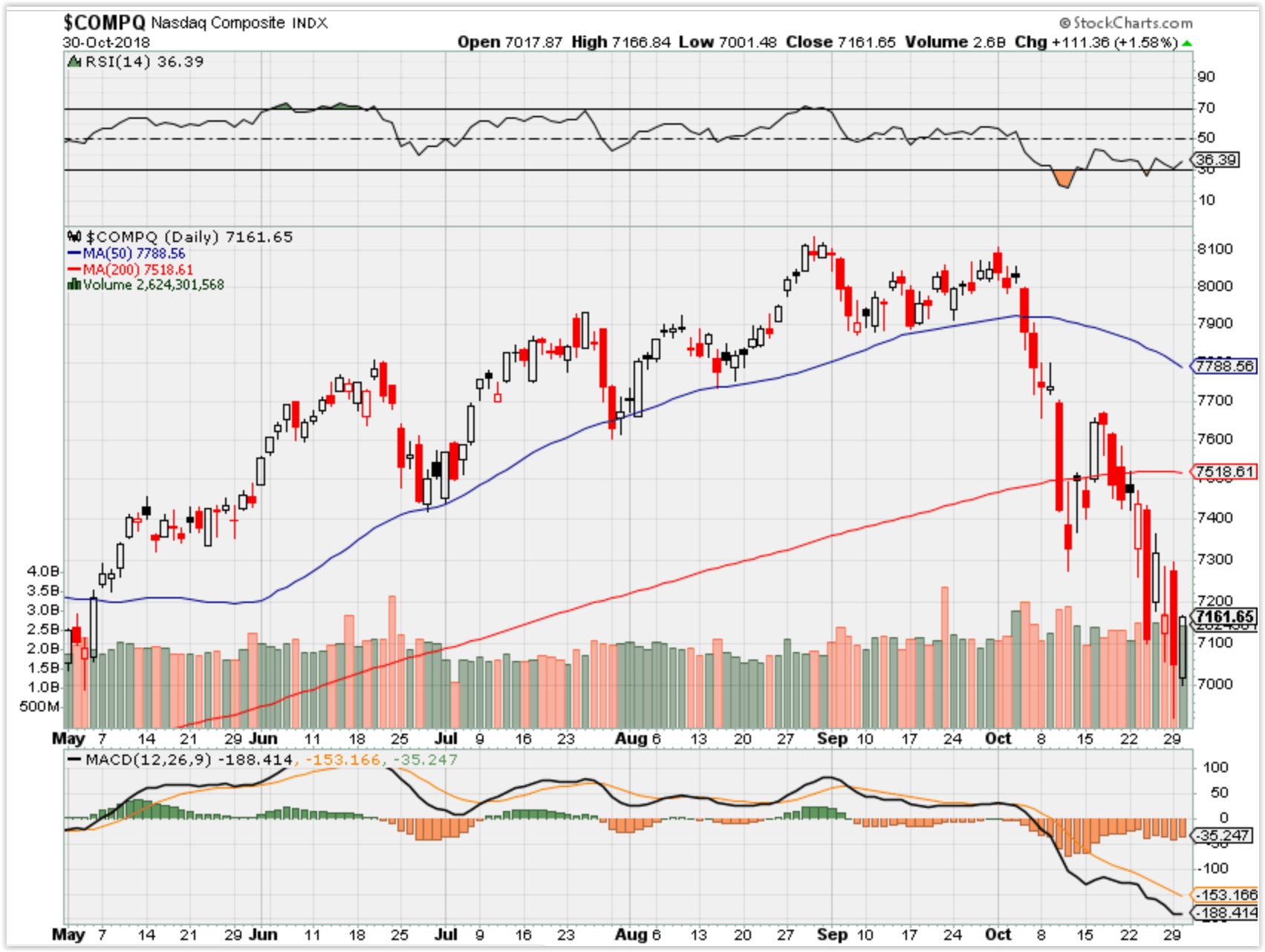HI Financial Services Commentary 10-30-2018
What I want to talk about today?
You Tube Video Link: https://youtu.be/ekzc8X-NvaA
2008 the new normal was a higher than average VIX or volatility in the market.
If you protect your nest egg, investments, savings the profits will come!!!!
IF you gain 50% and then lose 50% you may have a 2 year 0% average return on your portfolio
Averages are NOT Growth. BUT you real, portfolio growth is -25%
First time since 1950 that the S&P 500 had two 10% drops or more in a year
Keystones to Success – I’ve used in life, work, business, church, STOCK MARKET
- Belief – In your system, way to continue when thigs get tough
- Courage – Special kind of knowledge to be able to tell someone “exactly” how it is
- Desire – to weather the storms the market gives you
- Excellence – Doing your best without losing all your capital
- Failure – Successful people in the market are not afraid to fail
- Goals – S.M.A.R.T =
- Honesty – Fight Fear and Greed –
- Imagination – How different ways can an option be moved
- Opportunity – Are always present if we are willing to take them
- Persistence – The power to use your methodology (hold on) in spite of everything
I was able to weather a 2008 profitability and I see a way to beat the “average” expectations, returns and pains of typical, big box, asset allocation models currently used for the masses.
What happening this week and why?
Good news is Bad news and bad news is good news.
Reasons for the Fed to slow the rate of interest rate hikes = weaken the dollar for continued growth
Fundamentals will beat technical over time and sentiment trumps all
Where will our markets end this week?
????
DJIA – BEARISH
SPX – Bearish
COMP – Bearish
Where Will the SPX end October 2018?
10-30-2018 -8.0%
10-23-2018 -2.0%
10-16-2018 0.0%
10-09-2018 +1.5%
10-02-2018 +1.5%
Earnings:
Tues: AET, AGN, KO, CMI, GE, MA, PFE, EBAY, DENN, EA, FEYE, MDR, MGM, TMUS, VOYA, UAA, BIDU, FB
Wed: CLX, GRMN, EL, GM, K, TAP, SODA, S, YUM, CF, ESRX, FIT
Thur: D, TREE, NBL, SPOT, CBS, FLR, GPRO, KHC, P, RMAX, SHAK, X, SBUX, WU, WYNN, AAPL
Fri: BABA, CVX, CNK, XOM, VG
Econ Reports:
Tues: Consumer Confidence
Wed: MBA, ADP Employment
Thur: Initial, Continuing, Productivity, Unit Labor Costs, ISM Index, Construction Spending, Auto, Truck
Fri: Ave Workweek, Non-Farm Payroll, Private Payrolls, Unemployemnt Rate, Hourly Earnings, Factory orders, Trade Balance
Int’l:
Tues –
Wed – CN: NBS Manu PMI, BOJ: Interest Rate Decision
Thursday – CN: Caixin Manu PMI
Friday- EMU: Manu PMI
Sunday –
How am I looking to trade?
Protect the Stock Positions for earnings
AAPL 11/01 AMC
AOBC 12/06
BABA 11/02 BMO
BAC 10/15 BMO
BIDU 10/30 AMC
DIS 11/08 AMC
FB 10/30 AMC
MRVL 11/29
RHT 12/19
UAA 10/30 BMO
www.myhurleyinvestment.com = Blogsite
customerservice@hurleyinvestments.com = Email
Questions???
Fed needs to pause rate hikes to stabilize battered market, Ed Yardeni says
- The Fed can reverse the market decline by backing off its interest ratepolicy, veteran investment strategist Ed Yardeni says.
- He sees strong economic fundamentals supporting earnings growth through next year.
Stephanie Landsman | @stephlandsman
Published 5:10 PM ET Sat, 27 Oct 2018CNBC.com
The stock market is on pace for its worst October since the financial crisis.
But the Federal Reserve can reverse the damage by stepping away from its current interest rate hike policy, according to veteran investment strategist Ed Yardeni.
“We need the Fed to pause here and just take a breather,” the Yardeni Research President said Friday on CNBC’s “Trading Nation. “Let’s see how the economy plays out, and that will help the stock market a lot.”
His thoughts came as the market took investors on a volatile ride. The S&P 500 dropped almost 4 percent last week. In October alone, the index is off 8.5 percent. Meanwhile, the Dow is down more than 6 percent for the month.
Yardeni, who ran investment strategy for Prudential and Deutsche Bank, is not letting the market turmoil derail his long-term bull case for stocks. He sees strong economic fundamentals supporting earnings growth through next year.
“I don’t expect a recession any time soon,” Yardeni added.
He suggests an overzealous Fed may be the main source of Wall Street anxiety right now. There’s a belief that the Fed may raise interest rates too aggressively and seriously disrupt the economy and markets.
“Fed officials have been talking like mission accomplished — that it’s the best economy that we’ve ever had,” he said. “If it’s the best economy that we ever had, why raise interest rates? Why not leave it be if it’s growing with low inflation?”
Regardless of what the Fed ends up doing, Yardeni predicts the outcome of the Nov. 6 midterm elections will take some uncertainty out of the market. He also believes a strong holiday season will inject some cheer into the market.
“I think it’s going to be the best retail season we’ve ever had. Consumers are really in very good shape,” Yardeni said. “That should help to turn the market around.”
Retiring in a down market can mean two-thirds less money for rest of your life: AIG Retirement CEO
- Retiring at the right or wrong time in the stock marketcan be a “game changer” for Americans in their golden years, AIG Retirement CEO Jana Greer says.
- Greer cited an AIG study that showed 79 percent of investors are concerned about a stock market decline.
- The best way to fight off retirement anxietyis to develop other sources of protected lifetime income in addition to savings, she says.
Tyler Clifford | @_TylerTheTyler_
Published 9:37 AM ET Fri, 26 Oct 2018 Updated 3:52 PM ET Fri, 26 Oct 2018CNBC.com
Withdrawing money from savings for retirement during a down stock market can be a “game changer” for Americans in their golden years, American International Group Retirement CEO Jana Greer told CNBC.
Greer cited a study that compared two people retiring just two years apart; the first one in a market downtown and the second in an upturn. She said the impact can be “huge.”
Fifteen years later, if you look back, “that person who retired and took withdraws during that early period can have two-thirds less” for the rest of their lives, Greer said on “Squawk Box.”
Greer also talked about the results of another study, conducted by AIG in January, saying 79 percent of investors are concerned about a stock market decline, with good reason.
The stock market hit records in late January but plunged shortly thereafter. It took until the summer to eclipse those all-time highs. But earlier this month, the market came under severe pressure on fears of rising interest rates. Trading has been highly volatile ever since.
The AIG data also showed 61 percent of those surveyed said their “greatest fear” is outliving retirement savings.
The best way to fight off that anxiety is to develop other sources of protected lifetime income like a pension or an annuity, “things that you can rely on that are stable that are going to give you a monthly check for life,” Greer said.
“You can cover your expenses and then you don’t have to do the withdraws,” she added. “Otherwise, you’re going to have to withdraw right at the wrong time.”
That’s important for the aging U.S. population where 1 in 4 adults will soon be of retiring age, Greer said.
Nearly half of the S&P 500 is in a bear market. Here’s where to hide out
Published 7:02 AM ET Fri, 26 Oct 2018 Updated 10:05 AM ET Fri, 26 Oct 2018CNBC.com
Wall Street looks to close out the week with more than 43 percent of the S&P 500 in a bear market, having fallen at least 20 percent from 52-week highs.
With volatile swings taking down so many S&P 500 names, Chantico Global CEO Gina Sanchez says a flight to value stocks could be the best way to weather any more turbulence.
“We’re telling our clients that they should be looking for more robust earnings. We’re looking for more value names,” Sanchez said on CNBC’s “Trading Nation” on Thursday.
Value stocks are favored for their low valuations with an emphasis on consistent earnings and high dividend yields. The opposite approach, growth investing, focuses on future potential, and investors often pay a high premium to the rest of the market.
“If you look at the value ETF IVE and you look at the individual stocks in the IVE and the estimates that are being forecasted, it seems like there’s actually tremendous upside for the value ETF even from here,” added Sanchez.
The IVE value ETF is expected to post earnings growth in fiscal 2018 more than double that of a year earlier as tax cuts fatten up the bottom line. ETF components such as AT&T and Ford have already reported earnings beats.
“Value has re-established itself finally as a leader in the market, and it’s been a very long time since we’ve seen that, and I actually think that this run has some legs,” said Sanchez.
The past week’s steep sell-offs have Strategic Wealth Partners President Mark Tepper seeing value in two stocks: an airline and a biotech firm.
“We like American Airlines and Celgene, and the market isn’t fully appreciating their growth potential right now, so they’re trading at really significant discounts,” Tepper said on “Trading Nation” on Thursday. “One of the things we like to look at is PEG ratio, which is how much investors are willing to pay for a company’s growth.”
The PEG ratio, or price/earnings to growth ratio, provides a snapshot of a company’s ability to expand measured against its valuation. The lower a PEG ratio, the more undervalued a company might be relative to its growth potential. The S&P 500 trades with a PEG ratio of 1.2 forward earnings, while American trades at 0.5 and Celgene at 0.36.
“Both of these have a significant margin of safety, and I think long-term investors are going to be very happy if they’re holding these stocks,” added Tepper.
https://www.cnbc.com/2018/10/26/theres-a-major-reason-for-this-stock-sell-off-the-dollar.html
There’s a major reason for this stock sell-off that people are missing, and it’s only getting worse
- Executives are talking about challengesto their business they didn’t face just a few months ago. One of the biggest, they said, is the rising U.S. dollar.
- A widening gulf between the U.S. dollar and several foreign currencies is weighing on sentiment for U.S. companies trying to sell their goods overseas.
- Anheuser-Busch, 3M, Illinois Tool Works, UPS and PPG Industries have specifically cited currency as negatively impacting results and their outlook.
Published 6:51 AM ET Fri, 26 Oct 2018 Updated 6:33 PM ET Fri, 26 Oct 2018CNBC.com
The October stock market sell-off has been puzzling to many investors because most companies are riding high on business confidence and a tax-cut windfall.
Plus, profit growth has been solid, and many companies have been beating expectations on strong sales numbers and a positive outlook.
But one real worry cited on post-earnings conference calls is the rising U.S. dollar, which makes business overseas more expensive for U.S. companies. The strong dollar was cited by companies as varied as Anheuser-Busch and PPG Industries.
And it’s a problem that is only getting worse. The gains in the U.S. Dollar Index, a measure of the greenback against a basket of major currencies, are accelerating, up another 2 percent in the last one month. By no coincidence, the S&P 500 has headed lower at the same time.
3M revised its earnings per share estimate to include a 5 cent per share hit from currency translation. It previously had factored in a gain of 10 cents a share. And United Parcel Service said currency fluctuations could be a drag of $35 million to $45 million in the fourth quarter.
Add that to rising interest rates, rising fuel costs and the early effects of tariffs on imports of steel, aluminum and other manufacturing materials, and executives have struck a more cautious tone for the near term, though the overall message is still positive.
The dollar was higher versus most currencies again on Friday morning as stock futures pointed to another big drop.
“The market doesn’t believe 2019 growth is going to be anywhere near what it is expected to be,” said Nick Raich, CEO of research firm Earnings Scout.
Raich adds that there’s no evidence any of these fears will come true. Estimates for 2019 first- and second-quarter earnings have actually inched up, he said. And revenue growth of 8 percent for the S&P 500 companies that have reported so far is outpacing expense growth.
‘Unfavorable impact’
Anheuser-Busch on Thursday slashed its dividend in half and said beer sales fell during the third quarter. Currency volatility is a challenge for the brewing giant, which bought U.K.-based SABMiller in 2016. “In the last six months, we’ve seen a lot of [currency] volatility,” Chief Financial Officer Felipe Dutra told reporters on a conference call Thursday, as reported by Reuters. “This scenario triggers some sort of uncertainty and at a certain point … we thought it was the right time to adjust the dividend.”
PPG, an industrial bellwether, said currency turned into a headwind the third quarter as the dollar strengthened. Currency translation lowered sales $80 million and pretax income took a hit of $15 million. It also said sales could be cut $50 million to $60 million in the fourth quarter because of the “unfavorable impact” of currency translation.
Illinois Took Works said year-over-year earnings growth of 11 percent, to $1.90 per share, was on the high end of its range but included 3 cents a share of “unfavorable currency translation impact.”
Companies have had to adjust to account for the stronger dollar. “We’ve taken some other actions around the emerging markets and initiatives to ensure that we can overcome that,” UPS CFO Richard Peretz said on a call with analysts. “That’s one of the reasons we’ve called out the guidance for the total company to remain where we expect it to be even given this new headwind.”
Currency isn’t the only extra cost companies are facing. On Thursday, Southwest Airlines reported record third-quarter profit that beat expectations, then burst the bubble by saying its costs were going up more than expected, largely because of fuel. American Airlines said a 42 percent increase in fuel costs ate into its third-quarter profit despite record revenue.
More than one-third of companies reporting earnings so far have mentioned the Trump administration’s tariffs. Harley Davidson said it will pay at least $40 million more this year to cover such costs.
Estimates for next year reflect optimistic company guidance on sales and their ability to pass some of the higher costs on to customers, Morgan Stanley analysts said in a note last week. But tech is more vulnerable to profit-margin pressure, they said, as are consumer discretionary and transportation stocks.
Texas Instruments, like other semiconductor companies, is also seeing weakness ahead. While it beat profit expectations, it issued a weaker fourth-quarter outlook blaming slower demand. “We are heading into a softer market,” CFO Rafael Lizardi said on a conference call this week. “We believe this is mostly driven by a slowdown in semiconductors.” That slowdown, executives said, comes after several years of strong growth.
https://www.ksl.com/article/46413171/3-secrets-to-success-from-some-of-utahs-top-business-leaders
3 secrets to success from some of Utah’s top business leaders
By Better Business Bureau Of Utah | Posted – Oct 25th, 2018 @ 9:00pm
This story is sponsored by Better Business Bureau of Utah.
Succeeding in business is no easy feat. The path to prosperity is riddled with obstacles, and there’s no one-size-fits-all method to overcome them. However, there are several tricks that top businesspeople know and use daily to make the most of the opportunities they encounter.
Here are three insider tips from successful Utah business leaders.
Adopt a growth mindset, and don’t be afraid to fail
Dave Elkington, the founder and CEO of InsideSales.com, told the Deseret News failure and mistakes are inevitable in entrepreneurship. He emphasized the importance of optimism and adaptability in surpassing these low points.
“You have to be insanely resilient and insanely patient,” he said. “If you’re humble enough, then you’ll listen to other people, learn lessons and won’t make the same mistakes,” he said.
Being able to bounce back from setbacks is not a skill people are born with; it’s a quality they develop in response to adversity or build up on their own. Resilience requires a mindset that frames difficulties as challenges and mistakes as learning opportunities. It pairs well with humility; both are key traits of effective leaders.
Embrace risk and constructive criticism
In a similar vein, Marc Harrison, president and CEO of Intermountain Healthcare, focuses on his company’s growth potential, but he places a special emphasis on the importance of healthy, beneficial interactions with his team and customers.
Harrison describes himself as inclusive and supportive of his leaders, whom he trusts to make major decisions without micromanagement. To Harrison, listening and strong relationships are imperative. He told Modern Healthcare he advises fellow executives to be simultaneously receptive to and critical of feedback.
“Take constructive criticism,” he said, “but filter it through a process that allows you to determine whether the folks who are your fans or your critics are giving you good advice and modulate accordingly.”
Take constructive criticism, but filter it through a process that allows you to determine whether the folks who are your fans or your critics are giving you good advice and modulate accordingly.
Be authentic, honest and motivational
Margo Georgiadis has a history of leadership at high-profile companies, with a resume that includes Discover Financial Services, Google, Groupon, McDonald’s and Mattel. Now, she’s the CEO at Ancestry.com, based in Lehi, Utah.
Her best business leadership advice? Motivate the people you’re managing by creating a collaborative, open atmosphere and communicating confidence in their ability to do their jobs. Georgiadis said being excited and transparent with your team can help you lead by example.
“Be authentic,” Geordiadis said. “People want to work for people that are honest. In a lot of businesses, you don’t know all the answers, and I think sometimes leaders try to be too polished… People just want to know that you have a vision, that you’re going to be accountable for it, and you’re going to be honest about what’s working and not working.”
There’s one bonus key to success that all three of these leaders have in common: transparency. In the age of information, honesty and integrity are absolutely crucial to success in business.




